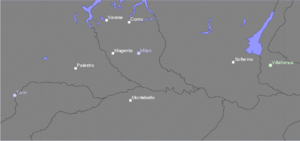| Battle of Magenta | |||||||
|---|---|---|---|---|---|---|---|
| Part of the Second Italian War of Independence | |||||||
 The Battle of Magenta by Gerolamo Induno, 1861 (Musée de l'Armée, Paris) | |||||||
| |||||||
| Belligerents | |||||||
|
|
| ||||||
| Commanders and leaders | |||||||
|
|
| ||||||
| Strength | |||||||
|
49,945 infantry[2] 1,207 cavalry 87 guns |
58,183 infantry[3] 3,435 cavalry 152 guns | ||||||
| Casualties and losses | |||||||
|
707 killed 3,223 wounded 655 missing Total: 4,585 |
1,368 killed 4,358 wounded 4,500 missing Total: 10,226 | ||||||

The Battle of Magenta was fought on 4 June 1859 near the town of Magenta in the Kingdom of Lombardy–Venetia, a crown land of the Austrian Empire, during the Second Italian War of Independence. It resulted in a French-Sardinian victory under Napoleon III against the Austrians under Marshal Ferenc Gyulay.
Napoleon III's army crossed the Ticino River and outflanked the Austrian right forcing the Austrian army under Gyulay to retreat. The confined nature of the country, a vast spread of orchards cut up by streams and irrigation canals, precluded elaborate manoeuvre. The Austrians turned every house into a miniature fortress. The brunt of the fighting was borne by 5,000 grenadiers of the French Imperial Guard, still mostly in their First Empire style of uniforms. The battle of Magenta was not a particularly large battle, but it was a decisive victory for the Franco-Sardinian alliance. Patrice de MacMahon was created Duke of Magenta for his role in this battle, and would later go on to serve as President of the French Third Republic.
- ^ Ambès, Intimate Memoirs of Napoleon III: Personal Reminiscences of the Man and the Emperor, 1912, p. 148.
- ^ Brooks 2009, p. 37.
- ^ Brooks 2009, p. 38.